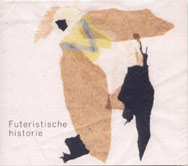Futeristische Historie
Futeristische Historie
(Data)
Sometimes
I happen to find a CD in my mailbox that I didn't ask for, and that
I know nothing about; very often, unfortunately, one listening session
makes me wish for the CD in question never having arrived at its natural
destination, having disappeared, and so being lost for ever, during
the trip. It's with great pleasure that I can declare the present CD
as a brilliant exception to that rule.
The
last time I (aurally) met Guus Jannsen was about one year ago, while
he was sitting at the piano in a duet with Han Bennink on a CD titled
Groet. Here he is again, but this time playing a pipe organ in a dialogue
with bass clarinet player David Kweksilber and cello player Winnyfred
Beldman: two musicians whom, I'm afraid, I meet here for the very first
time.
Brilliantly
recorded (this is a good time as any to compliment Dick Lucas for his
nice work: I can say I don't own a single CD whose technical part he
worked on which sounds any less than good), Futeristische Historie is
the kind of album that - though not simple at all in the kind of logic
running underneath - is in a way not at all difficult to listen to,
thanks to a limpid musical thought, a careful performance, and a certain
user-friendliness of the final result. In a way, it's an album that
well represents a "Dutch" way of considering music, where
Classical music, Jazz and Impro go hand-in-hand.
This
time, we have a reference to Messiaen (starting from the title) in Éternité
De Oiseaux, with its nice theme for violoncello; a nice unison opening
by violoncello and clarinet, and a solo part for organ which sounds
almost-Bachian, on the track titled Memory Protect, with also a good
solo by the bass clarinet; a very personal version of Ellengton's Solitude
(played on the pipe organ!); the svelte, jazzy theme in Into My Heart;
the organ, first skeletal, then lyric, in Passage; the theme, which
sounds as almost-ragtime, in Bad Timing.
It
goes without saying that all the musicians in question show a very fine
degree of interplay, their instruments changing roles quite often, and
that sometimes musical moments that in a different context would sound
"normal", can sound as quite unusual thanks to the chosen
instrumentation.
In
a nutshell, this is an album whose commercial indifference has to be
repaid in the only way that really counts.
Beppe Colli
© Beppe Colli 2006
CloudsandClocks.net | March 24, 2006











